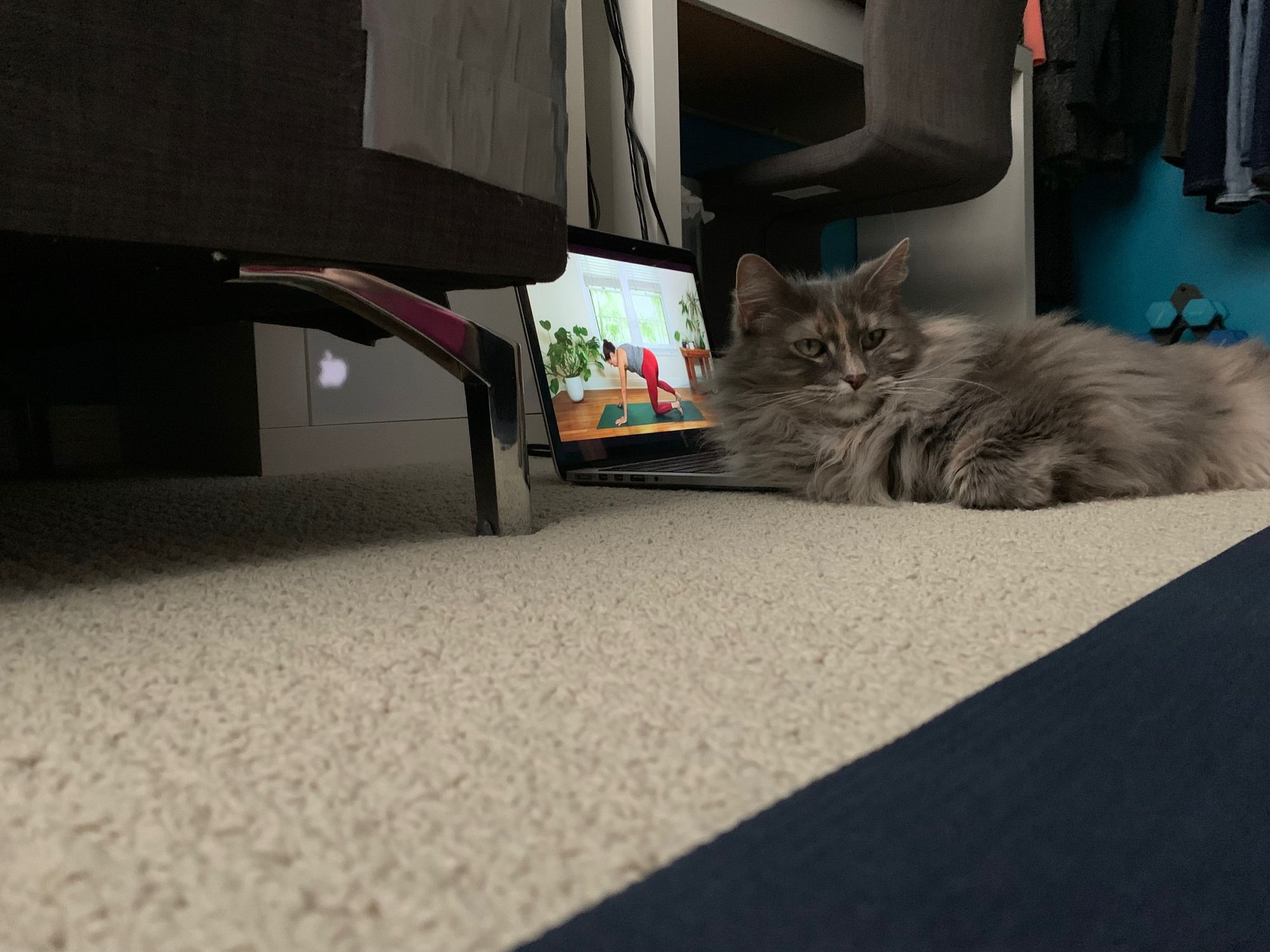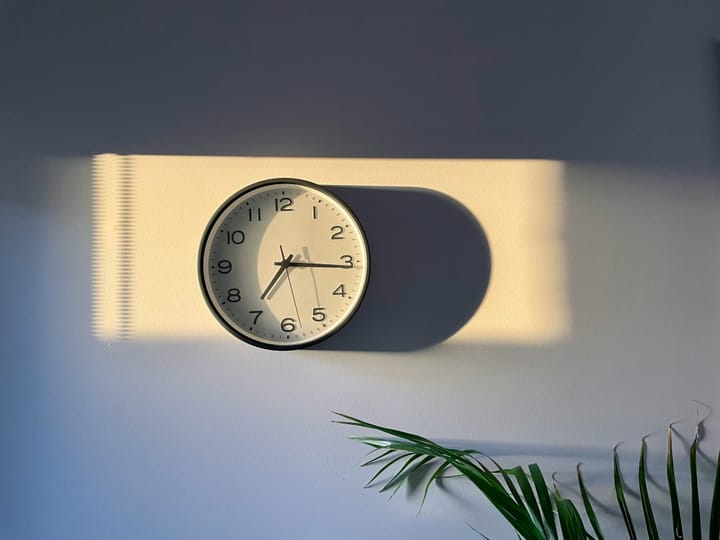Exercise is a Productivity Tool Part 1: Breaking Down the Untrue Stories We Tell Ourselves
Exercise is one of the best tools in your toolkit to boost your energy, motivation, and overall productivity.

For most of my life, I considered myself uncoordinated and unathletic. As a child and into adolescence I grew very fast, pushing 5’10” by the time I was twelve. My brain had a hard time keeping up with my body which resulted in a lot of skinned knees and elbows and was likely a strong contributor to my general feelings of clumsiness. I was likened to a baby giraffe more than a few times.
I never played organized sports outside of gym class and despite my height, I didn’t have a natural, immediate talent for things like volleyball or basketball. As an early perfectionist, this meant I shied away from fitness and sports and leaned into academics where I knew I could shine.
Fast forward to my young adulthood and the feeling of being unathletic and uncoordinated stuck with me. I tried several different gym memberships and fitness classes, rationally knowing that exercise was important to my overall health, but my efforts always inevitably fizzled out. I felt awkward, uncomfortable, and really didn’t enjoy any of it.
So I didn’t exercise much.
As I entered my late 20s and early 30s, any motivation to do any kind of fitness was overshadowed by the hard things happening in my life. It seemed like I just didn’t have the time or energy for exercise.
The motivation to add fitness to every day (initially) came in the form of my MS diagnosis the year I turned 33. After 2 months of feeling depressed and anxious post-diagnosis, I decided something had to give. My body felt out of control and I needed to take it back so I started a 30-day yoga challenge (via Yoga with Adrienne).
My mental health improved after just a few weeks of 15 to 30 minutes of yoga every day. My daily energy and motivation increased, and it significantly reduced my anxiety. I started to learn more and more poses and got stronger and more flexible. 30 days turned into 60, which turned into 90, and then I just didn’t stop.
Over time I decided to try other types of fitness and kept the ones I liked. It changed from being a question of IF I would exercise, to when and what type of exercise. The answer would vary depending on how I was feeling (both physically and mentally) and what my day looked like.
Exercising every day became a habit, but even more, it became a productivity tool. Exercise became:
- something I could do to clear my head
- something that helped me boost my energy to get through the afternoon slump
- a way to ease anxiety and refocus when I was feeling scattered
It felt easier to think, be creative, and, even on the days I didn’t feel great, it felt like something I could do for myself to move the needle in the right direction.

The (untrue) stories we tell ourselves about exercise
You might be thinking: Ok, cool, that’s great for you, but how do I get motivated to exercise?
What got me motivated and made my exercise habit stick was:
- Feeling like I had taken control of my body and my health (not just in relation to MS, but in general).
- The immediate improvements I felt in my mental health, sleep, and motivation.
- The improvements in my overall productivity, both professionally and personally.
It was through these changes that I came to understand some of the stories that I had told myself over the years about exercise were simply untrue.
Some of these might be stories you tell yourself too. Stories like:
- I don’t have time to work out
- I am not athletic
- I don’t like working out
We all have the stories we tell ourselves about who we are. We tell ourselves we are unorganized, or uncoordinated, or we can’t cook, or… we can’t, we can’t, we can’t. Of course, there are things that we are more gifted at than others. We all have things that come easier to us than others.
But some of the stories we tell ourselves are limiting at best… and damaging at worst.
I think the stories around exercise are in that damaging category. I have come to learn how important exercise is to my daily energy, mental health, and overall productivity.
When I think about the tools in my productivity toolkit to increase my motivation and energy, exercise is near the top of my list.
Let’s break down some of these stories, how to reframe them, and add exercise as one of your productivity tools!

1. Story: I don’t have time to exercise
One of the most prevalent stories that come up when talking about fitness is that you don’t have time to do it. Fitness gets categorized with things you would like to do but is often considered a luxury…and not even a luxury you particularly want. It’s something that you do “if you have time”.
Truth: You haven’t prioritized fitness
The truth is, we all have the same amount of time. The problem is not that you don’t have enough time but that you have too many priorities, and you haven’t prioritized fitness.
Exercise is also one of the priorities that usually falls down the list when life gets hectic. This is the opposite of what should happen since movement and exercise have been shown in studies over and over again to:
- Reduce stress
- Elevate mood
- Increase concentration and focus
- Improve sleep
- Increase mental stamina
- Enhance creativity
It seems like a no-brainer to prioritize exercise especially when things get hard, but that is not how things usually go.
There are of course realities of life like injury or illness and sometimes something has to give so exercise has to fall off the list. But generally speaking, under normal circumstances, you can fit 15 minutes of some kind of movement into every day to help you manage everything better.
Reframe: I get to choose what I do with my time and can prioritize exercise as part of my daily routine.
2. Story: I am not athletic
Another story that is common, that I subscribed to myself, is that fitness requires athleticism…and you are not athletic. The baby giraffe feeling stuck with me for a LOOOOOONG time.
Truth: You don’t need to be athletic to exercise
Straight up: you don’t have to be athletic for exercise to be part of your life. You don’t have to do a sport that requires a specific skill. You can be any level of ability and athleticism to add movement to your routine.
You just need to find a type of movement that suits your ability and start where you are at.
My first foray into daily exercise was yoga because it was free, I could do it at home, with no equipment (a mat is nice but not required), fit it into any day at any time, and for whatever length of time I had available. If I got home late from an event or wasn’t feeling great, I could do a low-impact wind-down routine for 15-minutes. If I had more time and was feeling up to it, I could do a more intense full session.
I didn’t know the poses (or the many names of the poses) but I could mimic what I saw in the videos and there was no one there to judge me if I lost my balance and fell over (which was often at first 😅).
If yoga is not for you, try something else. Even going for a walk every day or gentle stretching are great ways to get some movement into your day and require no athleticism whatsoever.
Reframe: I can choose a type of daily exercise within my ability to do every day.

3. Story: I don’t like exercise
Not enjoying working out or sports is a story that I have said out loud myself. It’s a fair one. Being sweaty and out of breath can be unpleasant. Plus, I expect many of us have had somewhat traumatic grade school experiences with various sports that make us wrinkle our noses at the thought of doing them (I’m looking at you junior high basketball…😬).
Truth: You haven’t found a type of exercise that is right for you
There are many different types of exercise, fitness, and sports and just because you don’t like some of them, doesn’t mean they are all terrible.
It’s a matter of experimenting and finding something you do enjoy, or at least that you don’t hate.
For example, I know that I tend to enjoy solo exercise activities like my home yoga practice or solo running versus classes or organized sports. My husband is the opposite where he prefers going to play squash on league night.
There are three things to reframe when you tell yourself you don’t like working out:
- Working out/fitness/exercise doesn’t have to be HIIT or ultimate frisbee (though they could be!) or whatever makes you cringe. It is anything that gets you moving. Dance, walk, stretch, you name it.
- When we tell ourselves we don’t like something, we often won’t even try it. But what if you were wrong? That was my experience with running. For a long time, it was not something I even considered since I assumed it was hateful and people who liked it were another species. But then I tried it, and tried it again, and each time it got a bit easier. Running became meditative for me and I enjoyed it.
- When you first start many types of exercise, they are unfamiliar and/or your body is not used to them. This means that they feel hard. It’s easy to get discouraged, especially if you lean toward perfectionism like me and want to be good at something immediately. But remember, perfect is the enemy of good and almost anything gets easier with practice.
Reframe: Exercise comes in many forms. I can be open to trying new things and I don’t need to be perfect (or even good) to start.
Why exercise every day?
Lots of people exercise a few times a week and that is great. If you can keep that up and make it part of your weekly rhythm, it’s awesome. No shade thrown there.
I am a supporter of exercise every day because I think it’s easier to keep it up when you don’t give yourself the option of a skip day. It is so common for one skip day to turn into another, and another, and then suddenly you haven’t done anything for weeks.
I am not suggesting you should go hard every day. That is asking for an injury due to overtraining. Instead, listen to your body and decide what works for you. Rest days can still have exercise, but something low impact.
Every day I ask myself: What type of exercise will I do today, and when?
(Versus: Will I exercise today? No. I don’t think I will…maybe tomorrow)
I usually decide what type of exercise I will do day-to-day based on what I did the day before, how my body feels, and the weather (if I am considering a walk or run). On the days when I feel like garbage or I’m sore, I usually do some gentle yoga. On the days I feel good, I go for a run or do some combination of HIIT/cardio, pilates, or weights.
I always feel better when I exercise, no matter the type. I have more energy for all parts of my life and it always feels like I have made an investment in myself.
Exercise has become one of my most important productivity tools.
How do I add exercise into my daily routine?
I hope I got you thinking about the stories you tell yourself about where exercise fits into your life and whether or not they are true. I hope I got you thinking about the ways you can reframe exercise and use it as part of your productivity tool kit.
The hardest part is reframing, but once you do, you can start!
In my next article, I will provide some strategies to help you add exercise to your daily routine to help boost your energy, motivation, and overall productivity.
Do you need some help calming your chaos to figure out how to add exercise to your day? Get in touch!
Share
Ashley Janssen

Productivity consultant, writer, speaker, serial entrepreneur, chaos calmer, introvert, cat-lady. Lover of books, fitness, old fashioned’s, basketball, and video games.
Follow me on
Twitter
or
LinkedIn.
Hire me for
1 on 1 productivity consulting
or
speaking.
Related articles

When You Do Things Matters

What If Being Lazy Was a Good Thing?


Comments ()